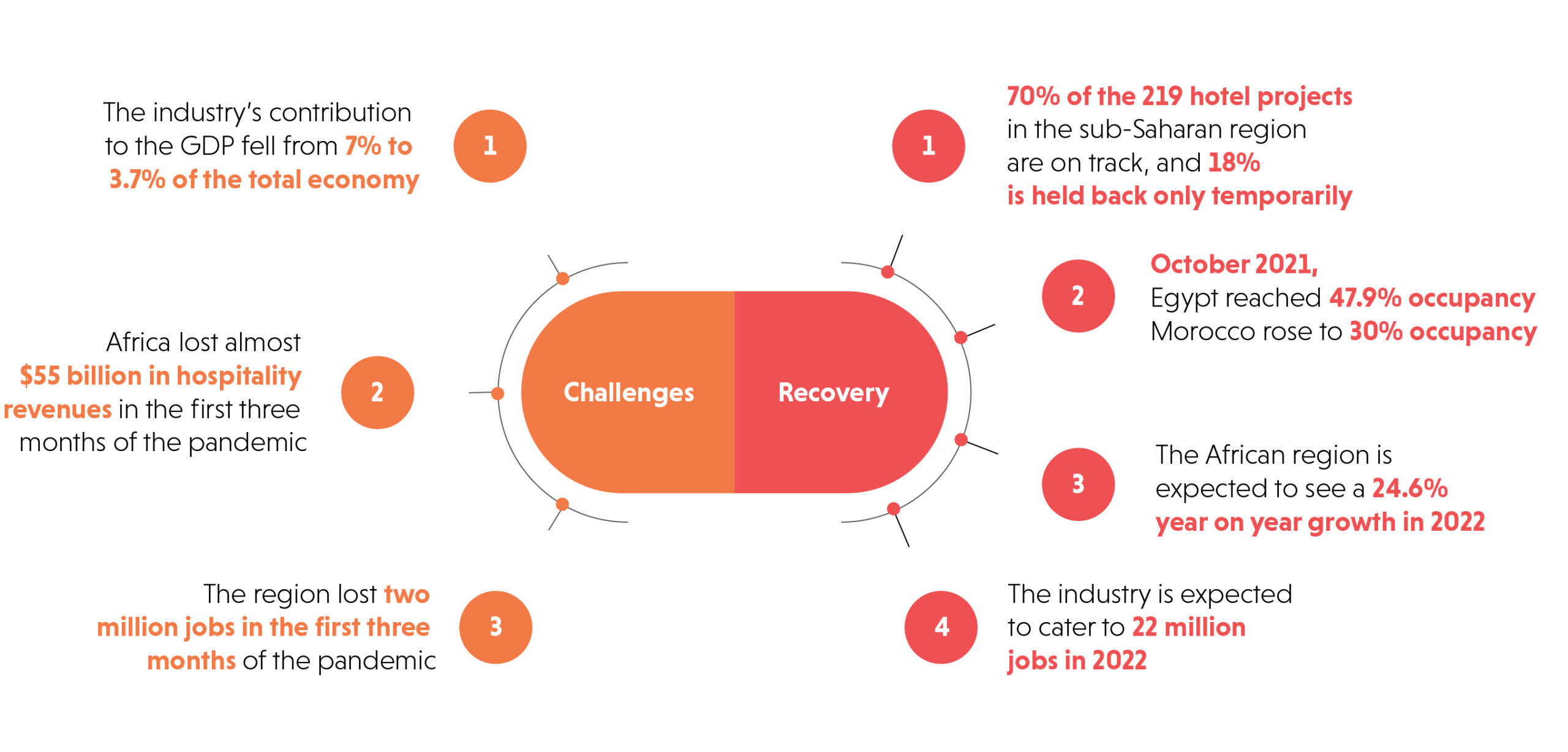Hospitality Trends
February Issue, 2022
Trends to Chase: How hoteliers can stay relevant in 2022.

The fall, recovery, and growth of the African hospitality industry
The hospitality industry is a vital sector for the African economy for the job opportunities it presents as well as the flow of foreign currency it brings. In 2019, the hotel and tourism industry in the region amounted to around 7% of Africa’s GDP and contributed $169 billion to its economy. Needless to say, the pandemic led to unprecedented declines in the industry. However, the region has now bounced back and is now on the road to recovery and growth.
A few challenging years
When the global pandemic brought international tourism to a complete standstill, the industry’s contribution to the GDP fell to 3.7% of the total economy, amounting to $86 billion. This was a fall of 49.2%, halving the hospitality industry’s contribution. This led to a loss of more than seven million jobs in the travel and tourism sector as well.
Studies have shown that $4.8 billion in receipts from international tourism was lost in the East African Community countries alone in 2020. This affected employment in the industry, with about two million jobs lost in the tourism sector in these countries. In South Africa, the hospitality industry was nearly at a stalemate since February 2020 due to national lockdowns where hotels fell under non-essential services.
By July 2020, the African Union estimated that Africa lost almost $55 billion in hospitality revenues and two million jobs during the first three months of the pandemic.
Optimism for the future
The hospitality industry in the African region was already on a growing trend prior to the pandemic, with the number of branded hotels in the African market growing eight-fold between 2010 and 2020. As tourism picks up, the African hospitality industry will have more capacity than it did prior to the pandemic. In 2021, 71 deals with 10,000 rooms were signed, marking a lower impact on deal signing from Covid-19. The slow pace due to the pandemic allowed hotel management companies to negotiate deals with hotel developers, making way for the industry to grow despite the pandemic. Moreover, about 70% of the 219 hotel projects in the sub-Saharan region are on track, and 18% is held back only temporarily. By October 2021, Egypt reached 47.9% occupancy, which was nearly double the rates of 2020. Morocco, too, saw a rise in occupancy levels from 26.8% in 2020 to 30% in 2021.
The African region placed the primary focus of their recovery plans on local tourism. Before the pandemic in 2019, domestic tourism made up 55% of the region’s travel and tourism spending. Following the low hospitality incomes due to the pandemic, Rwanda looked to develop its local and regional markets while Kenya cut down entry fees to all game parks and reserves to attract more local tourists. However, the domestic tourism industry in Africa remains largely untapped. Tourism experts believe that the domestic market could be leveraged better if more authentic and greener resorts were developed, and more products aimed at middle-class African families and millennials were introduced. The domestic spending in the African region is expected to see a 24.6% year on year growth in 2022, achieving pre-pandemic levels within the year.
Along with the rise in demand within the hospitality sector, more job opportunities will also become available. The World Travel & Tourism Council expects the number of those employed in the industry to see a year on year increase of 21.6%, amounting to 22 million jobs and achieving pre-pandemic levels in 2022. All of this would lead to a year on year GDP contribution increase of 24.6%, or $28 billion from the hospitality industry in 2022. These growth trends point out that despite the setbacks in the past two years, the African region will reach pre-pandemic levels of hospitality performance in 2022.
Want to know how IDS Next products will benefit your property?
